Dear Friends,
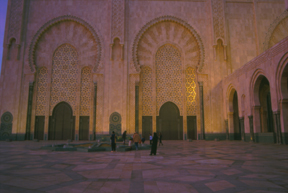 I got bitten by the travel bug again, after more than eight months of staying put around my home base of Orange County, California. I gave South America some serious consideration, especially now that it is summer in the more southern and chilly parts of the continent. But for various reasons, the most important of which is the chance to meet up with my brother Abdul, I settled on Africa. He is roaming around South Africa now and I will be there next week. But this report reaches you from the kingdom of Morocco. I left the bike at home this time and packed a relatively small backpack with the utmost minimum of gear.
I got bitten by the travel bug again, after more than eight months of staying put around my home base of Orange County, California. I gave South America some serious consideration, especially now that it is summer in the more southern and chilly parts of the continent. But for various reasons, the most important of which is the chance to meet up with my brother Abdul, I settled on Africa. He is roaming around South Africa now and I will be there next week. But this report reaches you from the kingdom of Morocco. I left the bike at home this time and packed a relatively small backpack with the utmost minimum of gear.
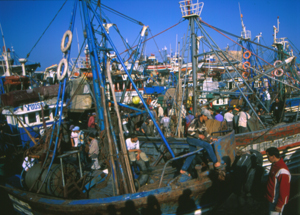 Unfortunately, tropical Africa remains out of reach for me because I did not get the numerous immunizations required for travel there. However, the northern and southern portions of the continent will be more than enough to tackle in such a short period as two months. At least that is the plan, but my plans don’t always pan out, as some of you know, and I may have to come up with alternatives.
Unfortunately, tropical Africa remains out of reach for me because I did not get the numerous immunizations required for travel there. However, the northern and southern portions of the continent will be more than enough to tackle in such a short period as two months. At least that is the plan, but my plans don’t always pan out, as some of you know, and I may have to come up with alternatives.
After two weeks here in Morocco I learned to read some arabic and even understand a few words, but for the life of me I can’t pick up french, the other important language of the country. As a former colony of France, Morocco has been either blessed or cursed (depending on one’s view) by a sort of dual Arab/Berber and European culture. Not only do large industrial cities such as Casablanca stand in stark contrast to tiny Saharan berber villages, but the people range from completely veiled to miniskirt wearing and midriff baring, often found walking arm in arm.
 However, three millennia of recorded civilization preceded the french colonization of Morocco and evidence of Phoenician, Carthaginian, Roman, and Arab conquests are everywhere. A few impressive roman ruins still dot the countryside, but the Arab Islamic influence has had by far the greatest impact on the original berber population. The primary language is Arabic and Islam permeates every aspect of life, including that of the beer swilling bar hoppers of metropolitan Casablanca and Rabat. On one occasion a young gun in levis and a DKNY shirt admitted to me how much he loved American women “because they all look like Britney Spears”. Two sentences later he exhorted the rigorous moral codes of Islam and how everyone should live by them. I’m sure he tries his hardest to meet those religious demands but the temptation of Britney’s supple loins must be just as great. Speaking of loins, one day I was completely minding my own business (really), walking down a busy street in the city of Agadir when two loin baring women literally crossed my path and one reached out with her handbag to stop me.
However, three millennia of recorded civilization preceded the french colonization of Morocco and evidence of Phoenician, Carthaginian, Roman, and Arab conquests are everywhere. A few impressive roman ruins still dot the countryside, but the Arab Islamic influence has had by far the greatest impact on the original berber population. The primary language is Arabic and Islam permeates every aspect of life, including that of the beer swilling bar hoppers of metropolitan Casablanca and Rabat. On one occasion a young gun in levis and a DKNY shirt admitted to me how much he loved American women “because they all look like Britney Spears”. Two sentences later he exhorted the rigorous moral codes of Islam and how everyone should live by them. I’m sure he tries his hardest to meet those religious demands but the temptation of Britney’s supple loins must be just as great. Speaking of loins, one day I was completely minding my own business (really), walking down a busy street in the city of Agadir when two loin baring women literally crossed my path and one reached out with her handbag to stop me.
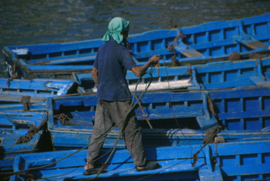 I did stop and looked up dazed to see a wild eyed Berber girl smile and say “bonsoir monsieur”. I didn’t really respond with anything that made sense, so they went on their merry way laughing. Obviously an exception, but this showed that Morocco is a relatively free society where everybody can live side by side. This realization was the biggest surprise that this country harbored for me. The other surprise, which I had been warned of previously, was just how adept most moroccans are at selling you virtually everything you don’t need. I naively considered myself a seasoned traveler, able to ward off all sales pitches and hustlers without a hitch, but the quick wit of these people left me dumbfounded. I was almost convinced to buy a portable refrigerator from one man. And when I really did need a jacket for the chilly Marrakech nights, a horde of sellers almost tore me to pieces trying to drag me into their little stores in a “suq” (a covered bazar). After on particularly burly berber got me into his store and showed me his selection of colorful handmade wool jackets, I settled on one and the battle for the price began in earnest. “How much would you like to pay for this, my friend?” the man asked me; prices are never fixed and every seller will try to squeeze the most out of customers, particularly foreigners. After much haggling, during which he theatrically accused me of trying to starve his family, we settled on what seemed fair to both of us. At least it seemed fair to me, he may have made a killing and only feigned moderate satisfaction. Afterwards he asked if he could interest me in a traditional jacket for my wife/mother/father/daughter/brother etc. Sometimes the salesmanship becomes very elaborate with invitations to mint tea or even a family dinner.
I did stop and looked up dazed to see a wild eyed Berber girl smile and say “bonsoir monsieur”. I didn’t really respond with anything that made sense, so they went on their merry way laughing. Obviously an exception, but this showed that Morocco is a relatively free society where everybody can live side by side. This realization was the biggest surprise that this country harbored for me. The other surprise, which I had been warned of previously, was just how adept most moroccans are at selling you virtually everything you don’t need. I naively considered myself a seasoned traveler, able to ward off all sales pitches and hustlers without a hitch, but the quick wit of these people left me dumbfounded. I was almost convinced to buy a portable refrigerator from one man. And when I really did need a jacket for the chilly Marrakech nights, a horde of sellers almost tore me to pieces trying to drag me into their little stores in a “suq” (a covered bazar). After on particularly burly berber got me into his store and showed me his selection of colorful handmade wool jackets, I settled on one and the battle for the price began in earnest. “How much would you like to pay for this, my friend?” the man asked me; prices are never fixed and every seller will try to squeeze the most out of customers, particularly foreigners. After much haggling, during which he theatrically accused me of trying to starve his family, we settled on what seemed fair to both of us. At least it seemed fair to me, he may have made a killing and only feigned moderate satisfaction. Afterwards he asked if he could interest me in a traditional jacket for my wife/mother/father/daughter/brother etc. Sometimes the salesmanship becomes very elaborate with invitations to mint tea or even a family dinner.
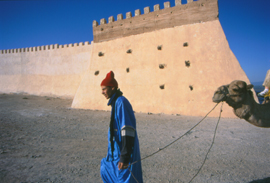 Then one should be aware of serious offense if not interested in buying after such a treat. Shopping in Morocco is always an adventure and the haggling is worth it if the goal is moroccan handicrafts. I have seen some incredibly beautiful thuya hardwood furniture and carvings, pottery, silver jewelry, leather jackets, and berber carpets. It must also be said that the architecture is a unique blend of repeating geometric patterns typical to Islam, Berber gilding, and a strong Andalusian influence from Spain. The result is for example a white, peach or pink hued house with a terra cotta roof and berber columns with intricate geometric patterns everywhere on walls and ceilings. Out in the countryside, reddish to brownish mud brick “qala” (a fort) are common, usually piled on top of each other to look like impressive fortresses. Fortress like walls also surround the “medina” (old town) of each and every city, while modern development spills over into the surroundings.
Then one should be aware of serious offense if not interested in buying after such a treat. Shopping in Morocco is always an adventure and the haggling is worth it if the goal is moroccan handicrafts. I have seen some incredibly beautiful thuya hardwood furniture and carvings, pottery, silver jewelry, leather jackets, and berber carpets. It must also be said that the architecture is a unique blend of repeating geometric patterns typical to Islam, Berber gilding, and a strong Andalusian influence from Spain. The result is for example a white, peach or pink hued house with a terra cotta roof and berber columns with intricate geometric patterns everywhere on walls and ceilings. Out in the countryside, reddish to brownish mud brick “qala” (a fort) are common, usually piled on top of each other to look like impressive fortresses. Fortress like walls also surround the “medina” (old town) of each and every city, while modern development spills over into the surroundings.
In the last couple of days all of Morocco and the islamic world celebrated “Eid”, a holy day held to commemorate biblical Abraham’s sacrificial offer of his son Isaac to God. After becoming convinced of Abraham’s absolute faith in him, God commanded him to sacrifice a sheep instead. So today, many many sheep were sacrificially slaughtered in people’s homes and great dinners were cooked with the meat and extended families gathered to feast. Leftovers are passed on to poorer neighbors who couldn’t afford a sheep. Although slaughters are not done on the street, the freshly cut off heads of the animals were brought outside and charred on hot fires, which let loose a pungent odor of burning wool. Someone explained to me that this way the wool burns off and the skin gets charred just enough. Then the rest of the cooking is done in an oven and the head is consumed as a delicacy.
Incidentally, a day before I noticed quite a few live sheep in the backs of trucks, in the open trunks of cars, in backseats, in frontseats, on donkey carts, even once on a motorcycle wedged between rider and fuel tank with all four legs projecting comically out to the sides. Little did they know in their docile manner that this would be their last trip.
Now is the time for me to join exactly such a dinner, as a new acquaintance invited me to his family’s home. Such hospitality is also very common among Moroccans, as this was not the first time I have been invited with an open heart into people’s homes here. I only have one more week left in this North African nation, before I continue down to South Africa to meet my brother Abdul. Although Saharan nations such as Mauritania and Mali also sound very tempting, there is too little time and too great distances to squeeze all of them in. Here alone, I barely scratched the surface. I hope you are all well and fine, keep your eyes peeled for more updates from elsewhere.
Solomon
January 2004
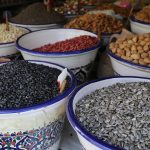
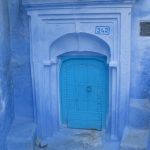
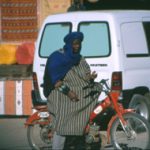
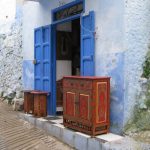

Leave a Reply